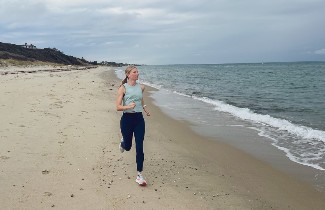





Alison Percowycz, MSN, FNP-C and WIld Rice Wellness provide virtual Integrative and Functional Medicine care to athletes in the state of Colorado. My mission is to keep athletes of any level performing at the top of their game by fine tuning their health and making sure their healthcare needs are met. I want to help athletes optimize nutrient levels, uncover areas that might be hindering performance and recovery and get them to optimal health. To me, there is a big difference between what is "normal" in traditional medicine and what is "optimal" for someone pursuing athletic endeavors and I am here to help get to the bottom of this. I am able to order lab testing such as basic blood work to more detailed micronutrient and macronutrient labs, gut microbiome testing, hormone testing and more. I also have a special interest in moms who are looking to get back to performing and athletics postpartum. Moms have unique needs in restoring nutrients and their bodies back to health so that they can pursue their passions and care for their families. I'm so excited to be a part of your journey to health and athletic performance! Be well!
$250
After the initial consultation, the next option is to join the monthly membership. With this membership we will have monthly one hour visits to check in and make adjustments as needed to the plan. You will also have access to on demand health education content and access to me for questions between...
VIEW MORE$450
After completing a detailed intake questionnaire, we will meet for 90-120 minutes to discuss, in great detail, your current health status and chief concerns to formulate a plan. At this visit, we will discuss if lab work is recommended to explore further (labs are an additional fee and always optio...
VIEW MORE$0
During this call we will briefly discuss your top areas of frustration with your health as well as your health goals and what you are looking for in a practitioner. I will then share with you my care philosophy and approach to treatment to see if we would be a good team to get you to living your hea...
VIEW MORE REQUEST TO BOOK
Athletes of every level spend a lot of time and money on the perfect t...Read More
Athletes of every level spend a lot of time and money on the perfect training plan, recovery tools, and making sure that their macros and fueling are on point (which is all important stuff!) but one place I see that isn’t totally dialed in is their actual health. You might be thinking, wait, aren’t athletes generally healthy? So why would they need to focus more on this? Well, I am here to tell you that even though, yes, athletes are generally healthy, there is usually room for improvement. I'm Alison Percowycz, Nurse Practitioner at Wild Rice Wellness an Integrative and Functional Medicine Practice and see time and time again the micronutrient deficiencies, anemias, and other areas that could use optimization in athletes that can affect training, performance, and recovery. In order to address these you have to test, you can’t just guess! Athletes should have routine labs done at least yearly, if not multiple times (like before and after a big training cycle) to tune into where there might be deficiencies or insufficiencies that could help improve their performance and most importantly, their health.
The following is a list of lab tests that, at a minimum, every athlete should have done at least yearly. These can typically be done by your regular healthcare provider and done at any standard lab. However, what the labs and conventional medicine declares as “normal” is often not optimal for peak performance. I work with athletes located in Colorado (and soon Florida!) on making sure their health is as fine tuned as their training plan. The following are the basic labs that I recommend to be drawn at least yearly:
1. Complete Blood Count: Even this one simple test can give indicators of inflammation, anemias, nutrient deficiencies and more.
2. Complete Metabolic Panel -This test is a good overview of kidney and liver function, fasting glucose, electrolytes levels (sodium, potassium, calcium)
3. Hemoglobin A1c - This is an average level of the previous three months blood glucose levels and can be an indicator of blood glucose balance/regulation and diabetes
4. Fasting insulin - This is often a more sensitive and earlier detector of blood glucose dysregulation than the A1c or fasting glucose
5. Full thyroid panel (TSH, T4, T3, reverse T3 and antibodies) - The thyroid is vital for energy, mood, metabolism and heart rate regulation, oxygen consumption and more. High or low thyroid conditions can contribute to weight gain/loss, infertility, irregular periods, difficulty with temperature regulation, hair loss, fatigue and so much more.
Iron panel + ferritin - energy metabolism, oxygen transportation in the body, low iron can result in fatigue, hair loss, thyroid dysfunction, difficulty with endurance and recovery
6. Vitamin B12: The B vitamins and B12 in particular are critical for red blood cell production, DNA and protein synthesis, and energy production.
7. Vitamin D: This vital hormone affects immune function, bone health, recovery from training and much more. Most people are deficient or insufficient unless supplementing, even in Sunny Colorado!
8. Highly sensitive C-reactive Protein (HsCRP): This is a general marker of inflammation. Training of any kind but especially high volume training is inflammatory so we want to keep a gauge on this to make sure the body is not overly inflamed where we will need to look at other potential causes. (side note: this lab should not be done after a workout as it can be falsely elevated).
It is important to remember that what is considered "normal" is often times not optimal for an athlete and working with a practitioner that can dig deep into the labs to see where there are potential deficiencies or insufficiencies is vitally important. In addition to the basic labs above, below is a list of more in depth testing from an integrative and functional approach that can help get to the bottom of underlying issues that athletes may face that can be addressed to get them to peak performance and health. These are not recommended for everyone but if there are nagging injuries, fatigue, GI disturbances or training plateaus these may be good additions:
1. RBC mineral testing (magnesium, zinc, copper) - These elemental minerals are critical for operating at peak performance, optimal recovery and immune function. Serum studies are do not as accurately reflect the true stores.
2. 4 point salivary cortisol: This test may be good if you are having difficulty maintaining your training volume or feeling extra fatigued, or have that “tired but wired” feeling that leaves you tired during the day but then have difficulty falling asleep or getting good sleep at bedtime.
3. Gut microbiome testing: This can be good for any ongoing GI symptoms like constipation/diarrhea/indigestion but also gives indicators of digestion, inflammation, immune function, toxic load, microbiome balance, presence of beneficial or pathogenic bacteria or parasites and relative abundance of microbes.
4. Hormone testing (serum testing or DUTCH specialty test): Hormone testing can give valuable insight into the different sex hormones which can significantly affect training in men and women. Serum testing can be done at a standard lab, and the Dutch test is a comprehensive test done at your home via dried urine/saliva to look at hormones and hormone metabolites and areas that need attention.
5. Micronutrient testing (Genova Diagnostics NutraEval or Metabolomoix+): The most in depth micronutrient testing out there, which looks at antioxidant, vitamin, and mineral levels, essential fatty acid ratios, amino acid levels and balance, digestive support, cellular energy and mitochondrial markers, toxins and oxidative stress markers. This can help to make sure nutrition/supplementation is optimal on every level. This is one the top tests for athletes looking to get the most out of their training and recovery.
6. Essential and Metabolic Fatty acid profile: This is done at many standard labs and looks at the balance of the different fatty acids, looking specifically at omega 3 levels which are anti-inflammatory and can enhance training and recovery.
7. Nutrigenomic testing: There are more and more DNA type tests looks at your DNA and how different foods interact with it, gives insight on how your genes interact with environmental factors like nutrition, digestion, energy/methlyation, inflammation, detoxification.
If you are in Colorado (soon Florida) and looking for a practitioner who can help with ordering, interpreting and providing actionable steps to improve your labs and your health. Please visit my website Wild Rice Wellness to book a free 15 minute consultation to discuss more about your health and your health needs!

0

0

0
you must login

Endurance athletes have unique needs in many aspects of health compare...Read More
Endurance athletes have unique needs in many aspects of health compared to the general population. Since we are in peak cold and flu season, I wanted to share some interesting literature on just how endurance training impacts our body’s ability to remain healthy. Personally, over the years, I cannot count the number of times I have come down with an upper respiratory infection just after a marathon/ultramarathon event or long training session. I always brushed it off that my body was tired or that it was just poor timing but didn't think too deeply into it. However, I have recently dug into the literature and there is actually scientific evidence surrounding this phenomenon!
There are several published studies that show after a prolonged, intense endurance workout (which is perceived by the body as an extreme physiologic stressor) that the immune response takes a hit. Post-exercise immune function is impaired the greatest when exercise is continuous and longer than 1.5 hours, of moderate to severe intensity (50-77% VO2 max) and when performed without caloric intake. There are various measures of immune function that are shown to be disrupted after prolonged endurance activity including: lower leukocyte and neutrophil (white blood cell) count, reduced Natural Killer Cell activity, decreased serum immunoglobulin concentration and a decrease in plasma glutamine. Glutamine is an important fuel source for immune cells and also helps to maintain the integrity of the gut lining. These all can take 3-72 hours to recover after activity is complete.
Nutritional status can also affect immune function in athletes. Energy-restricted diets as well as macro- and micronutrient deficiencies have a negative impact on immune function. In addition, improper fueling during the endurance activity can also lead to immune compromise.
Any training amount, but specifically high volume training, is a stressor on the body and causes acute inflammation which helps us adapt and build skeletal muscle. This process is known as mitohormesis or mitochondrial biogenesis, where a mild to moderate amount of acute oxidative stress leads to training gains. This acute phase of stress is good but can also affect the immune response and cause other disruptions in the body.
So, what can help to offset this?
1. Fueling properly during prolonged, intense exercise (especially with adequate carbohydrates).
2. Refueling with adequate protein, carbohydrates and fats post-workout.
3. Focusing on proper recovery, especially getting good, restorative sleep.
4. Incorporate mindfulness which can help to reduce cortisol and improve immune function.
5. Consider a high quality multivitamin/mineral supplement but avoid high levels of Vitamin C and E prior to and immediately post workout as well as long term high doses of these antioxidants during peak training seasons. Having high levels of these antioxidants has been shown to blunt some of the adaptive benefits of exercise by reducing inflammation so that the hormetic effect of training and building is inhibited.
6. Conversely, plant derived antioxidants like sulforaphane (found in broccoli and cruciferous veggies), curcumin (from tumeric), and polyphenols (like in berries & green tea) have been shown to activate a pathway called Nrf2 (the master antioxidant regulator) which stimulates mitohormesis aka good stress and can be helpful with training related inflammation and recovery. Getting these through diet is best but there are some potent supplements that incorporate these various compounds as well.
6. Consider taking in glutamine post-workout to help enhance the immune response and also helps to heal the gut lining which can be disrupted from acute stress, like exercise.
7. Focus on a high quality, balanced diet with enough calories to nourish and recover.
If you are looking to fine tune any of the above, I am available to see patients in Colorado. Head on over to wildricewellness.com (link in bio) to book a free consultation!
If you are in Colorado, and looking for a medical practitioner to partner with to make sure your immune system and health are ready to keep up with your training, check out Wild Rice Wellness or book a free 15 minute intro consultation (Book here!)
References:
Gunzer W, Konrad M, Pail E. Exercise-induced immunodepression in endurance athletes and nutritional intervention with carbohydrate, protein and fat-what is possible, what is not? Nutrients. 2012 Sep;4(9):1187-1212. doi: 10.3390/nu4091187. Epub 2012 Sep 4. PMID: 23112908; PMCID: PMC3475230.
Li S, Fasipe B, Laher I. Potential harms of supplementation with high doses of antioxidants in athletes. J Exerc Sci Fit. 2022 Oct;20(4):269-275. doi: 10.1016/j.jesf.2022.06.001. Epub 2022 Jun 11. PMID: 35812825; PMCID: PMC9241084.
Fernández-Lázaro D, Mielgo-Ayuso J, Seco Calvo J, Córdova Martínez A, Caballero García A, Fernandez-Lazaro CI. Modulation of Exercise-Induced Muscle Damage, Inflammation, and Oxidative Markers by Curcumin Supplementation in a Physically Active Population: A Systematic Review. Nutrients. 2020 Feb 15;12(2):501. doi: 10.3390/nu12020501. PMID: 32075287; PMCID: PMC7071279.
Mason SA, Trewin AJ, Parker L, Wadley GD. Antioxidant supplements and endurance exercise: Current evidence and mechanistic insights. Redox Biol. 2020 Aug;35:101471. doi: 10.1016/j.redox.2020.101471. Epub 2020 Feb 20. PMID: 32127289; PMCID: PMC7284926.
Castell LM, Newsholme EA. The effects of oral glutamine supplementation on athletes after prolonged, exhaustive exercise. Nutrition. 1997 Jul-Aug;13(7-8):738-42. doi: 10.1016/s0899-9007(97)83036-5. PMID: 9263279.
Castell LM, Poortmans JR, Newsholme EA. Does glutamine have a role in reducing infections in athletes? Eur J Appl Physiol Occup Physiol. 1996;73(5):488-90. doi: 10.1007/BF00334429. PMID: 8803512.
Monye I, Adelowo AB. Strengthening immunity through healthy lifestyle practices: Recommendations for lifestyle interventions in the management of COVID‐19. Lifestyle Medicine. 2020 Jul;1(1):e7. doi: 10.1002/lim2.7. Epub 2020 Oct 3. PMCID: PMC7646052.

0

0

0
you must login
Alison Percowycz, MSN, FNP-C and WIld Rice Wellness provide virtual Integrative and Functional Medicine care to athletes in the state of Colorado. My mission is to keep athletes of any level performing at the top of their game by fine tuning their health and making sure their healthcare needs are met. I want to help athletes optimize nutrient levels, uncover areas that might be hindering performance and recovery and get them to optimal health. To me, there is a big difference between what is "normal" in traditional medicine and what is "optimal" for someone pursuing athletic endeavors and I am here to help get to the bottom of this. I am able to order lab testing such as basic blood work to more detailed micronutrient and macronutrient labs, gut microbiome testing, hormone testing and more. I also have a special interest in moms who are looking to get back to performing and athletics postpartum. Moms have unique needs in restoring nutrients and their bodies back to health so that they can pursue their passions and care for their families. I'm so excited to be a part of your journey to health and athletic performance! Be well!
Training Block was created with a mission to support and empower runners, in order to elevate our sport. We do so by giving runners access to a network of local sport performance providers, who provide runners with the care they need from coaching, physical therapy, massage, strength training, and more. We also give providers an easy way to connect with each other and share articles, videos, and other resources that benefit runners and providers alike. For every service booked through Training Block, we donate 10% of our revenues to Training Block’s Elite Athlete Fund, which sponsors elite runners who do not have professional contracts and need financial support for racing at their highest level.
Copyright © 2024 Training Block. All rights reserved.
Refer a friend and get $5 discount on order!